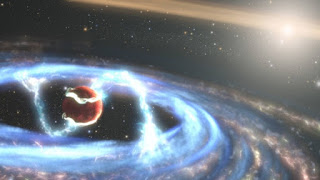Circular Reasoning Silliness in Cosmic Evolution
Whether it is cosmic or biological, atoms-to-astronomer evolutionary concepts are being herded by unscientific philosophical biases and presuppositions into the corral of atheistic naturalism. Using some critical thinking skills, people can reduce the deception.
We have two articles to consider regarding cosmic evolution. These provide clear illustrations from astronomy of several basic approaches used in biology as well. As discussed in other posts, everyone has presuppositions of unproved beliefs that are assumed to be facts. For the most part, people are unaware that they are using them.
 |
Supposed newly forming exoplanet PDS 70b, credits: NASA, ESA, STScI, Joseph Olmsted (STScI) (Usage does not imply endorsement of site contents) |
A rather impressive term is unargued philosophical bias. Secularists assume that evolution happens slowly — except when it doesn't. Astronomers claim to be able to see a moon forming from dust around exoplanet PDS 70b (hey, that's my license plate number!), but their unargued philosophical bias is of onward and upward, simple to complex; they may not consider that they may be seeing the opposite of what they want. Also, nobody can observe much of anything at those distances, so we're given artists' conceptions.
Darwin was a child of the Victorian age of progress. Watching the growth of British culture and technology, he began to see everything as improving over time, evolving upward and onward, whether finches, barnacles or chemicals. No one has infected scientific thought with this bias more than Darwin. It even infects astronomy.
Astronomers and physicists should know better. They know that the laws of thermodynamics preclude “progress” toward higher states of order except in very special circumstances. Without energy directed toward progress, orderly states (like hurricanes or snowflakes) are temporary and low in information content.
But because the astronomy consensus believes that we humans came4 from a big bang, the myth of progress is evident in astronomy and cosmology. From lifeless clumps of matter, stars evolved. From stars, galaxies evolved. From galaxies, planets evolved, From planets, moons evolved… which brings us to our exercise in critical thinking for today.
You can read the rest of this very useful article at "Exomoon Seen Forming in Astronomers’ Imaginations". Remember, we have another article to consider.
These jaspers insist that where there's water, there's life. Not hardly! In fact, stuff that kinda sorta resembles water is included in their philosophies. Remember when it was thought that Mars was a desert world, mayhaps some water was at the polar caps? Later on, remember how there was talk of a global flood there, even though water was never conclusively found (yet they deny all the evidence for the global Genesis Flood on Earth...weird). Now we learn that an overlooked explanation fit the data better than wishful thinking.
Things continue to get truly bizarre by the excitement of secular scientists that maybe perhaps there was water not only on Mars in the distant past, but also on Venus! Sure, that's mighty helpful. Then the strangeness continues.
What scientists thought might be water on Mars turns out to be clay. While it’s good that scientists corrected their mistake, the story points to a common brain malady in planetary science that sends researchers on fruitless quests to find life. (Hydrobioscopy is our term for a focus on water as a biological signal, ignoring the fact that water is a necessary but vastly insufficient ingredient for life.)
To splash into the rest of the article, see "Water on the Planetary Science Brain". Materialists sure do put a lot of effort to deny the obvious work of the Creator.